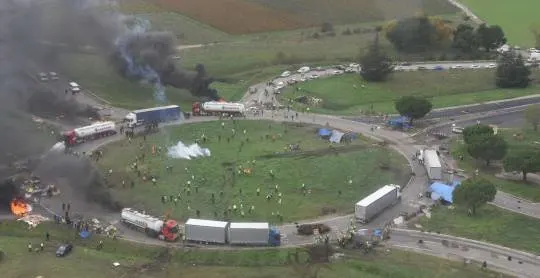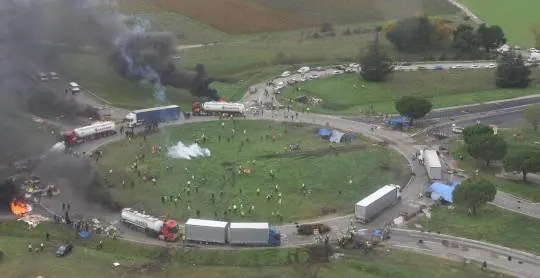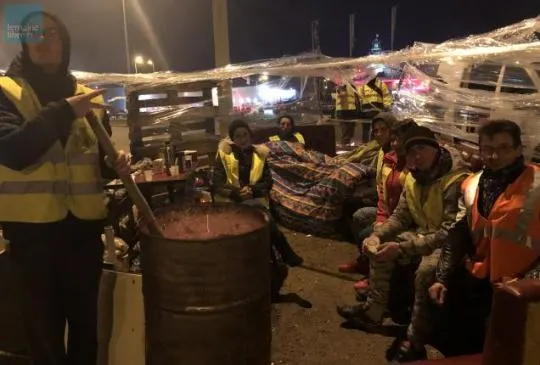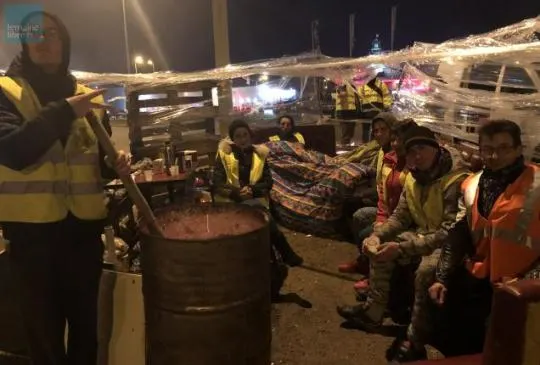Rupture Within the Contribution
Anonymous
The authors of the December 7 article, “Contribution to the rupture in progress,” continue their analysis of the Yellow Vests movement. As they argue, the Saturday battles are now behind us, and it is the roundabouts and self-organization beginning at the local level that forms the line of increasing power within the current movement. 1
Other languages: Français
It’s a serious mistake to believe that people are made stupid by staying in a single place. —William Cobbett
“And the State Sank…”
The week of December 3rd was marked by a massive deluge of state and media propaganda, in a drama that had several obvious aims: (i) to provoke fear, and to intimidate the population by alluding to the possibility of live ammo being used against demonstrators; (ii) to legitimate—that is, to encourage—a loss of control by police and state forces under the pretense of exhaustion; (iii) to avoid addressing the repeated transgressions of the line separating law enforcement from irregular warfare (flashballs shot directly at faces, high school students yoked and kneeling, a woman killed by a tear gas grenade); (iv) to announce, as now occurs with every supposedly important event (e.g. May 1, 2018) that ‘Paris will be under siege for twenty-four hours, and this time security forces will be deployed to their maximum potential’, which includes plainclothes cops in yellow vests and tanks sporting new chemical weaponry; (v) to add an umpteenth layer to the long-sought division between ‘peaceful’ protesters and the various ‘rioters’ or ‘ultra-whatevers’; (vi) to accuse the people carrying-out blockades of spoiling the end-of-year holidays for honest folks, and of allying themselves with those fractions of the movement deemed ‘violent’ and ‘parasitic’ by the government. In sum, we watched the highest rungs of the French state adopt the methods of psychological war against sixty-seven million suspects.
But the besieged aren’t the ones we ought to believe. It is important to recognize that the state has been pushed to the edge, that it’s alone, clinging to the walls of its kingly enclaves. Having been lured into what can only be described as a war against its own population, it now indulges in the very same illegalisms it purports to oppose, becoming even more conspiratorial than those it denounces. All mediation has disappeared. The entire Keynesian apparatus built-up over the past century now spills out beyond the state and its social movements and dries up. All the ‘social partners’, political parties, and intermediate bodies the Presidency had sought to draw into its sheepfold so as to shore-up the illusion of Providence are now condemned to preach in the desert. We’ve sensed it coming for decades: the final completion of the passage from the flexible, dialectical mediation of the Keynesian state to its Nietzschean successor, a steamroller of caste-affirmation without any need of allies of convenience, a castle with raised drawbridge. It may be that when the West of Paris burned, our collective agreements and negotiating mechanisms went up in smoke with it. In this context, demands begin to mean something different. It’s no longer about delegating our collective power to a representative (the movement within the State, or the State within the movement). Demands now form the basis for horizontal forms of association that fight for themselves and—once the silence of the authorities becomes structural—may even go as far as to overthrow them altogether.
That is why none of the deterrent operations were enough to weaken the movement, in spite of being echoed by all the political parties and unions (with the exception of Solidaires). In spite of the State blocking access to Paris train stations, continuously deleting Facebook events with demo locations (on orders originating who-knows-where), in spite of a smugly-announced ‘record number of preventative detentions’, not to mention a considerable number of people arrested and charged (and an equally large number detained without charge), the quality of expression and the mobility of the movement on Dec. 8 exceeded the previous two Saturdays. Moreover, a palpable sort of agreement existed between social groups that are often separated in urban riots (radicalized crowds from the provinces, from Paris and its suburbs, the usual militants and onlookers, etc.)…
It might be said that urban clashes over the last few weeks began in a frontal mode (Nov. 24th), then became polycentric (Dec. 1st), before finally becoming kinetic. On Dec 8th, while its intensity and crystallization diminished, its extension and movement grew. Rich neighborhoods were repeatedly ravaged by crowds determined to tear them to shreds. For hours, multiple areas of Paris became truly ungovernable, as the movement became temporarily sovereign. Things were the same, if not more so, in Bordeaux, Toulouse, Grenoble and Saint-Étienne. Here, the movement began to pull away from the illusory bicentennial Parisian theater of the riot, enacting a critique en acte of the consummate artificiality and ancestral nuisance of the political centrality of the capital. It signals a new victory, one which ought to be remembered and taken to heart in the coming weeks and months. The decentralized, reticular character of the current movement has been, and remains today its greatest tactical asset, in the streets of Paris no less than across the whole national territory.
Taken as a whole, the political sequence that began in France is marked by a negative dialectic between two independent blocs, the state and its ex-citizens, with no resolution possible. The vague inclinations toward mediation are little more than ornamental flourishes. For weeks, the trials of the thousands of arrestees have made it painfully obvious that the so-called ‘professional violent rioters’ do not exist. In Paris as elsewhere, the people showing up to these court cases are the temp workers from the same building, or else they’re nurses, carpenters, forklift drivers, ex-soldiers and, not uncommonly, the kids of cops. For many, this was their first visit to the Champs-Élysées. They came to see the boulevards, to see Parisian life, the life of rich tourists they neither know nor envy. If they looted a store, it was usually in order to give their offspring a decent Christmas. Politics? The word disgusts them. Often, they’ve never done it before. Once in the streets, they were joined by rogues and other precarious types, and this without any friction or tension. It’s not a convergence, it’s a contagion.


New Frontlines
The balance sheet was announced on Monday, December 10, as Macron gave his first public address. If you want to cancel a minor tax, speed up the approval of a pre-arranged supplement (not even a raise) to the minimum wage, or slash the tax on pensions, it will henceforth be necessary to ransack Paris, Toulouse, Bordeaux and other cities, accepting seven dead (and one more since then) and at least 1500 wounded—unprecedented damage in metropolitan France since the Algerian war. You’ll also have to wade through a morose national debate over non-sequiturs like French identity, immigration and so on.
Of course, the official political parties couldn’t resist joining the theatrics, and persisted in their clumsy efforts to seduce the “yellow vests” by echoing the government’s call for a ‘political moment’ to supplant the ‘moment of revolt.’ Breaking with custom, only the French Communist Party remained dignified, (involuntarily, no doubt), ignoring the agitations of the moment and calling for a great mobilization (but in January!) for as long as the movement continues… At the more molecular level of leftism, there’s no need for us to delve deep into the official Trotskyist lines, since in each and every circumstance, week after week, they always call for the same thing: a ‘convergence of struggles’, university blockades and a general strike…
As for the unions still mourning their Keynesian state, summoned like children by their schoolmaster, once they had finished with their violent about-face toward the movement (supportive, then dissociative, then supportive again), they wound up aligning themselves magnificently-well with the government’s prerogatives. All these compromises, absences and calumnies won’t be quickly forgotten. We can only hope that they’ll intensify the fragmentation of the trade union world, its re-localization into forms of situated association, and their becoming-heterogeneous with respect to the world of business—all of which has been already been underway since the 2016 movement, at least. The death of the left is a fact, but not yet an occasion for celebration: as it stands, it has birthed almost nothing in its wake.
As for the movement of yellow vests, the last two weeks have brought their share of defections, divisions, hesitations, captures. Among the three trends we identified in our previous article—electoralist or “citizenist”; negotiationist; and liberatory or insurrectionist—a section of the first group appears to have taken the lead with its the demand for a citizens’ initiative referendum, diluting into political ideality a revolt driven at least in part by financial hardship and marginalization. These self-proclaimed ‘democrats’ appointed representatives of the movement by ‘clicking’ on interposed candidates, rallying around those with the most charismatic authority. As concerns opportunist politicians of all stripes, they’ve long been licking their chops to join up with them. The 8th and the 15th of December already saw these two types of electoralists gather together before the cameras in Paris.
If “Act V” in Paris was in the end worthy of comparison with classical tragic drama, with its feeling of defeat and its too well-known end-of-movement atmosphere, the case is nonetheless not concluded between the State and the “yellow vests”. This past Saturday, it was only a forceful policing of bodies that momentarily triumphed over peoples’ widely shared taste for weekly insurrection. The police set up an apparatus identical to that of the previous Saturday, on top of which was added the closure of several freeways leading to Paris and other major cities, blocking entry to its main throughputs, and sifting exits of the train stations across the city. Even with all of this in place, the streets of Paris were still filled by a little less than half the number of protesters from the previous two Saturdays. At the same time, at virtually every roundabout in France, the party continued in full swing. A useful reminder, for those who would otherwise have forgotten, that uprisings can henceforth only take place in the absence of either an event or a center [un soulèvement ne peut plus se faire désormais que sans événement ni centre].
The strategic direction has changed. The last two weeks have shown the limits of a politics polarized by the event, which is to say, by its overly theatrical and spectacular rhythm of struggle. Truth be told, activists and journalists have been the only ones hypnotized like this: the slower dynamism within the movement has lost no strength, and today is much more important than those moments of convergence beneath the watchful eyes of cameras and metropolitan cops. On the other hand, the weakness of rebels and revolutionaries is, as always, to have underestimated the repressive and governmental resources of the State. Unfortunately, power has retained a huge margin of intervention for the months and years to come, and the indignation against its machinations has been miniscule. Along with the social rights of the welfare state, all the freedoms won within liberal democracies over the past two centuries may in turn find themselves violated or confiscated, more than they already have been, in any case. The current political unrest has also served as an occasion for a struggle at the highest rungs of the state, which could well see a long-term victory for the Minister of Finance and his sought-after ‘reforms.’ Decrying ‘too many taxes,’ we may see an even greater paralysis of the ‘left hand’ of the State, leading to a further destruction of the last safety nets for the poor. From the 1970s to the last decade, crises have always served as an opportune pretext for administering ‘shock therapy’ to the social body, a privileged mode of introducing neoliberal modes of capitalist government. One final observation on the current configuration of the forces: we had described (on December 6) what we saw as the ‘weak links’ in power—media, police, mayors. Today, we must admit that these three links have been thoroughly reclaimed by the authorities over the past two weeks, and did not, in any case, serve as orienting fixtures for the base cells of the movement in that time.
Over the past two weeks, the strongest and most vital frontline in the conflict has left the city centers, the regional capitals and Paris, and shifted to the roundabouts and smaller townships [communes], closer to the ‘yellow vests’ in their everyday life. In many places where occupations and blockades are occurring, deliberation and assembly today forms the most desirable horizon, in the absence of anything else. The government has, for its part, recognized this perfectly clearly, and has already launched a large national consultation at the level of town halls (some of which had opened grievances), thereby destituting, so to speak, the local understandings and practices produced through the mobilization, counterposing to them the eternal republican monolith.


“Nothing Will Have Taken Place but the Place Except Perhaps a Constellation”2
It is only an apparent paradox that the spirit of a movement (of course, when it is still new) resides not in its demands, but in its practices. The meaning of a political sequence [une politique] does not hang on its ideas but on its acts. In this sense, when a movement is insatiable, when people couldn’t tell you what it would take to bring it to a close (the burning question all the banal reporters incessantly ask the participants of all movements), this indicates well enough that there is something more at issue in it than questions of speed or slowness, or the price of gasoline, or purchasing power, or even democratic renewal—something more than ‘forty-two points’ or any political program. What is this ‘something more’? It is place, the political power of locality, as we have seen at the ZAD, and in every site of the last decade’s leaderless revolts (perhaps without the artifice of those sites that lacked any pre-existing relations). This is where the frontline lies. Macron knows it. Believing he had seen the end of all the mediations of the ‘social,’ he now finds himself confronted with real solidarities, weak, eroded, and trembling, but not disappeared. [Its consistency is] local, in the various interstices of the country, between cities and countrysides. It will undoubtedly be these already-existing relations and linkages, integrated into a familiar, accessible, and imaginable milieu, that will one day, in this movement or in another, form the definitive bases of a redefined ecological politics, one that transcends the old and nagging socialist question, by transforming it.
With the adventure of the yellow vests, locality [localité] 3 comes to the fore as the potential nucleus of a political subjectivation to come, antagonistic to the spheres of representation, whether existing or to come. On this subject, the call made by yellow vests at Commercy was lucid: “This is not the time to hand over our voice to a handful of people, even if they seem honest. They must listen to all of us or to no one! From Commercy, we therefore call for the creation throughout France of popular committees, which function in regular general assemblies. Places where speech is liberated, where one dares to express oneself, to practice it together with each other, and to help one another.” “Who needs interlocutors? Journalists and politicians. Do we? Not necessarily,” adds Alice L., a 28-year-old car driver living in Brittany, in the comments of a Facebook page. “Our organization already exists online, between friends, between neighbors, on the roundabouts. Just because it doesn’t fit within their idea of a ‘classic strike’, doesn’t mean it has no value” (Le monde, 10/12/2018). Having themselves already known this for a long time, on Sunday Dec. 9th the Committees for the Defense of the Catalan Republic donned yellow vests and opened toll-booths throughout their entire region. Over there, by contrast with the managerial municipalism of the mayor of Barcelona, a municipalist experience of villages coexists alongside “syndicats de barris”, neighborhood committees that emerged through practices of solidarity in low-income areas of the cities.
On the roundabouts here in France, collective cabins have already been constructed, serving as popular houses with their soups, crêpes, a whole tissue of resources, supplies, and assistance, gifts and counter-gifts that are mobilized beyond the movement to traders and producers, but which are also being directed toward the poorest folks who do not currently participate in the movement, in Issoire, Caen, Villefranche sur Saone and elsewhere. There are all sorts of exchanges of services, of time, barter of food, accompanied by an informal anti-commercial attitude and ethos typical of rural and semi-rural areas, in many cases never broken. There are these new temporary ‘families,’ with their operating bases in houses or at the houses of neighbors who take care of your children while the struggle continues. It has repeatedly been said that the “yellow vests” think first and foremost about the end of the month. Nothing could be more oversimplistic. The next generation’s fear of downward mobility, of a social mobility that would be not only more constrained, but which would have contracted, and even more the fear not only of economic but of ecological and especially ethical degradation of living conditions, weighs heavily on almost everyone’s minds. The “need for mutual aid and support that had found a last refuge in the narrow circle of the family, or among the neighbors of the slums of the big cities, in the villages, or in the secret associations of workers, reappears in our modern society as well,” wrote Kropotkin in 1902.
The constructive ideal of the movement will thus depend on its actual ethics, not on democratic fantasies that would only signify a diversion onto the path of institutionalization, a blackmail by political ‘outlets’ and a bureaucratization of desires. What is a creative power [une puissance créatrice], if not the potential for association, for contamination, for a constellation of revolts capable of combining themselves? It is true that mutual aid and practices of reciprocity are still quite fragile, and a far cry from the relief societies, cooperative associations political clubs and other direct action unions of the nineteenth century. This is because the current movement calls for other collective forms, which would be better adapted to a return to locality as the cardinal element of emancipatory politics. Deliberation and assemblies are, in this context, only certain pieces among others within an assemblage of autonomies that it is necessary to invent, from one week to the next, from one struggle to the next.
—Some Destituted Agents of the Imaginary Party
Translated by Ill Will
Notes
1. The footnotes below are our own as well. In a very small number of cases, we have omitted a sentence here or there, where the reference would mean nothing to anyone outside of France. We have indicated these omissions with ellipses. —Ill Will↰
2. “N’AURA EU LIEU QUE LE LIEU EXCEPTÉ PEUT-ÊTRE UNE CONSTELLATION.” A line from a poem by Stéphane Mallarmé.↰
3. Standard meaning of the word localité is ‘town’ or ‘village.’ However, given the inclusion of the ZAD within the imagination here, we’ve opted to use the term ‘locality’ instead of these more readily-circumscribed terms, in the hopes of widening the imagination of what such an ‘placement’ or localization of politics might look like↰